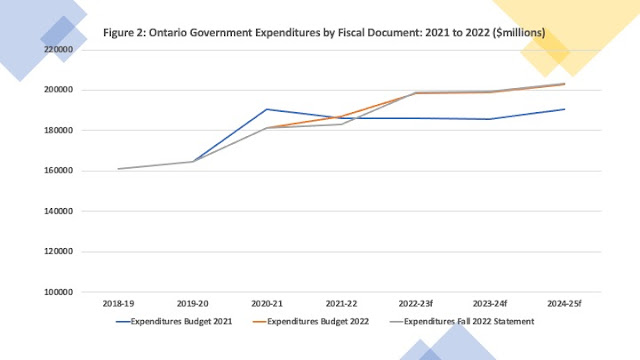Ontario will be announcing its 2023-24 budget on March 23rd
in the wake of its third quarter
fiscal update in February which reported a $6.5 billion deficit for 2022-23, an
improvement over the Fall Update which had the deficit pegged at nearly $12
billion. It would appear that fiscal
circumstances are shifting rapidly as the Ontario economy appears to continue
to exhibit robust growth resulting in revenues rising more than expected. Indeed, revenues in 2022-23 are projected to
be $16.6 billion higher than forecast in the 2022 budget and $9.6 billion
higher than was projected in the Fall 2022 update. Meanwhile, expenditure growth appears to be somewhat
more restrained. Compared to what was projected
in the 2022 budget, 2022-23 is only up $3.3 billion. Even in the case of health
spending – a contentious area given shortages and waiting lists – the province’s
financial Accountability Office has noted that going forward, the province
appears to be allocating billions of dollars
less than what is required.
Indeed, a glance at some charts shows that these shifting
projections go back even further to the 2021 budget that came as the pandemic
recovery began in earnest. Figures 1 and
2 plot revenues and expenditures as laid out by fiscal documents starting with
the 2021 budget, the 2022 budget and the fall 2022 economic and fiscal
update. Both expenditures and revenues have
shifted upwards with subsequent budgets and updates, but the shifts are more
dramatic for revenues than expenditures.
Compared to revenues in 2019-20 of $156 billion, for 2022-23, the 2021
budget forecast $160 billion, the 2022 budget forecast $180 billion and the
Fall 2022 update forecast nearly 187 billion to which the third Quarter update
has now brought us to $196 billion.
Despite the pandemic and fears of deflation and revenue collapse,
revenues today are $40 billion higher than 2019-20 – an increase of 26 percent.

As for
expenditures, from $165 billion in 2019-20, for 2022-23, the 2021 budget
forecast $186 billion, the 2022 budget forecast nearly $199 billion and the
Fall 2022 update a few hundred million more but still rounding out to $199
billion. We are now looking at expenditures
based on the third quarter update of nearly $202 billion. Since 2019-20, expenditures have grown by $37
billion – an increase of just over 22 percent.

What comes next over the course of fiscal year 2023-24
hinges on how the economy performs. If
we assume inflation coming down to 4 percent and real GDP growth of 2 percent,
that still brings us to nominal GDP growth of 6 percent. While 6 percent nominal growth is down from
the nominal growth rates in 2022 and 2023, there is no reason to believe it will
crash given the overall robustness of the Canadian and Ontario economies despite
increases in interest rates. Historically, a one percent increase in the
province’s nominal GDP is correlated with a greater than one percent increase
in total revenue meaning that one can probably expect total provincial
government revenues to rise by over 6 percent this year bringing revenues up
easily another $15 billion. With a
deficit for 2023-23 now being projected as per the third quarter finances at
$6.5 billion, it would not be a surprise if it comes in even lower and 2023-24
actually presents us with a hefty surplus.